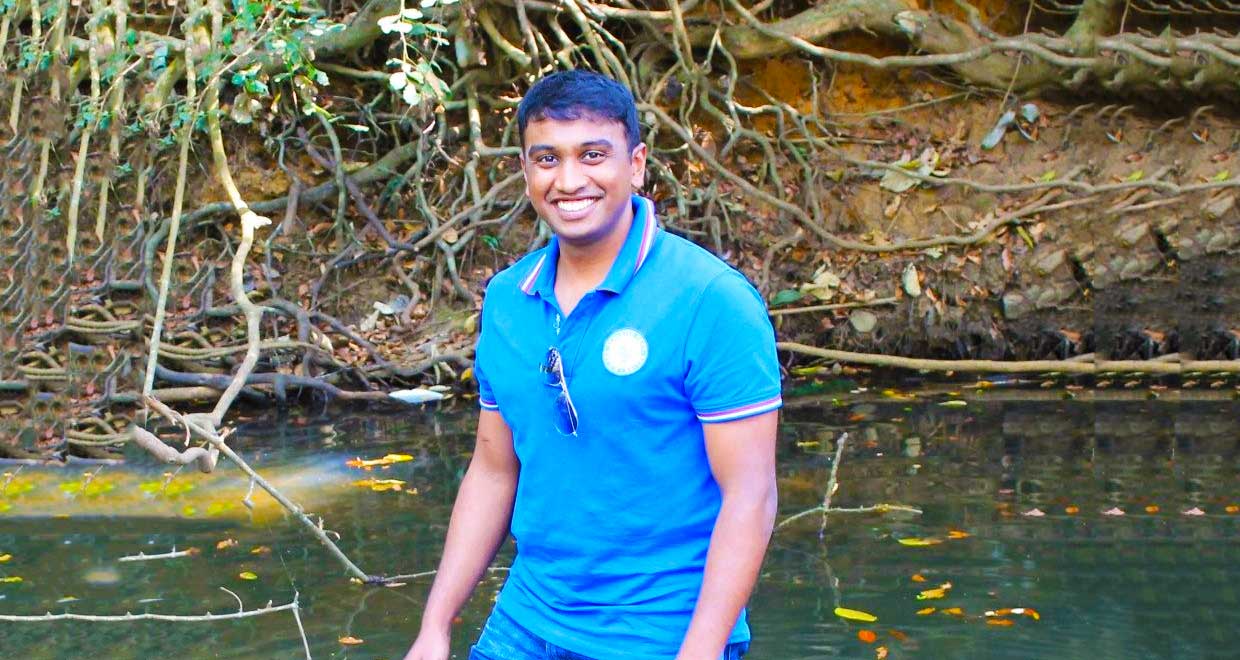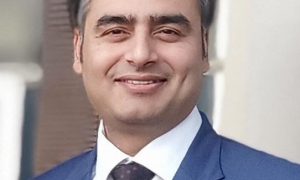Nagarjun Matangi graduated in law from NLSIU, Bangalore in 2011. As a student he was the Recipient of Vice Chancellor’s Gold Medal for “Outstanding Personal Achievement” and he was also the Vice President of Student Bar Association in the year 2009-10.
During his final year Hewlett-Packard (HP) had launched the Graduate Attorney Program in India and reached out to colleges – Nagarjun was among the two students who got selected from NLSIU (4 in total) as part their campus recruitment drive.
Since then Nagarjun has been working at Hewlett-Packard as a legal counsellor. His role includes a combination of Commercial Transaction support plus providing support for General Legal matters.
In this interview with Nagarjun we talk about:
- His college years as a part of NLSIU
- Planning his internships in his college years
- Starting work as a legal counsellor of Hewlett-Packard
- The HP India OGC Internship Program and the qualities they lookout for
- The legal department at HP
What made you gravitate towards the study of law at NLS? Was it planned or just a matter of chance?
It was completely unplanned and was an interesting turn of events. I hail from Andhra Pradesh where the choice is usually limited between Engineering and Medicine and I had never been able to fully decide upon my choice of stream. I spent seven years in Sainik School Korukonda which was a feeder institution to the National Defence Academy, but was for some reason inclined to remain a civilian. I could never get over the confusion as I had managed to secure a seat in institutions meant for completely different streams – IIT, Architecture and Law.
I chose Law primarily to overcome the stereotype of options that I observed around me and that turned out to be a truly rewarding choice of a lifetime.
What were your areas of interest during your graduation? How did you go about developing expertise and knowledge in these areas?
When you end up in law school by accident, you get excited and interested at everything that is introduced to you. I was very fascinated with Tax, Constitution and Family laws. However, what truly interested me were the Commercial Contracts and the difference that a crafty draftsman can make to the Contract. I used to try and pick up associated matters in my internship to understand how the Courts dealt with the interpretation of complex commercial clauses in a contract and I also used to select Seminar Courses that offer practical knowledge on these aspects. One would be surprised as to how much more this area of practice can offer beyond what is taught in classroom.
What do you have to say about mooting at law school and legal writing for journals? Are these helpful even after the student graduates?
I admit not having given much attention to either of these activities during law school; but it wasn’t something I had to regret. However, now that I am better informed, if I had an option to revisit my time as a law student, I would definitely make use of these options for they aid in developing essential skillsets at a very nascent stage. It would remain useful even after graduation.
Did you plan out your internships throughout law school or did it all just happen by chance? What role did the placement committee play in securing internships?
One of the pitfalls of accidentally ending up at law school, is that one would lack the requisite awareness about legal internships and how to plan them. Thanks to my seniors and friends at NLS, I could fill up this gap before it was far too late. This is also a reason why most of my internships were at trial and High Courts. While I did learn a great deal from my internships at these Courts, someone interested in a corporate profile would have prioritized and planned their internships a little differently.
It is essential for the fresh students to be educated at the option generally available through formal sessions that can be organized by the student body itself. Else, it could be too late before the batch can have its Placement Committee set-up.
Our Placement Committee played a great role in providing wider options and facilitating the selection process for these internships. Most students get introduced to formal In-house or law firm internships thru the Placement Committee.
You have been working at Hewlett-Packard as legal counsel since your graduation. How did your appointment take place? Please tell us about the recruitment process at Hewlett-Packard.
HP was implementing the Graduate Attorney Program in India for the first time in 2011 and had reached out to NLS and a couple of other colleges for this selection. This program was part of the Talent Factory initiative of HP’s Office of the General Counsel (OGC) which focuses on Making Talent internally rather than Taking Talent from outside the organization. The selection process involved two rounds of interviews, one each with the then Country Counsel of HP India and also with the regional Deputy General Counsel who had come down from Singapore for this purpose. This program is a regular feature in HP US and was being introduced in India only on a pilot basis. However, there is certainly a lot of enthusiasm and positive vibe around it here and it should not be long before we reach out to the colleges in India for implementing round 2 of this program again here.
That said, general recruitments at In-house legal teams, unlike law firms is strictly based on openings that may come up. It involves a combination of factors like the timing of the opening, the role and experience requirements sought for such opening, etc.
Tell us what your typical work day is like. What is the role of an in-house counsel at Hewlett-Packard? What are your primary responsibilities?
For most of us on HP’s Legal Team (OGC) in India, our role is a combination of Commercial Transaction Support plus providing support for General Legal matters. As part of transactional support, we are involved in drafting, reviewing and negotiating contracts concerning provision of various aspects of the Information Technology portfolio (services/software/hardware/cloud). This involves a lot of collaboration with the respective teams to understand the nature of IT solution being offered by HP, the risk associated, advising on mitigation strategies etc.
A good amount of my day is spent in meetings of this nature with various stakeholders of the contracting/tendering process as well as those involved in offering the solution. These are essentially my internal clients. Contract negotiations are the part I keenly look forward to and one gets to learn a great deal from these negotiations.
General legal matters include Data Privacy, Taxation (limited), Litigation Support, Commercial Disputes, Internal business advisory, Competition law etc. (new and interesting issues keep coming up for reference and the same may not fall into any particular bucket of practice). These cannot be further detailed.
Being a large MNC with diverse operations, guidance is sought from the legal team on numerous legal matters associated with the day to day functioning. Litigations and Consumer matters also form part of the portfolio of the legal team at HP. In addition to the same the team also needs to proactively align the business with the changing regulatory requirements and provide trainings as well as prepare suitable policies to guide all employees.
How is the legal department organized at HP?
HP India OGC is primarily segregated into teams that support a particular Business Unit of the Company. Various portfolios of the IT sector as handled by the respective Business Units. At the same time, the teams are not segregated into water tight compartmentalized structures. For example, today I may be primarily supporting the Printing and Personal Systems division of the company, but I can always extend support to the transactions involving Software licensing. This helps us diversify our experience in all portfolios that the IT industry has to offer, especially since HP’s operations extend into all these portfolios.
Other countries in our region (Asia-Pacific-Japan) have similar team structures and the entire region reports into the Deputy General Counsel for APJ. The DGCs of all regions across the world finally report into the General Counsel based at our HQ in Palo Alto.
What is the basic difference that you see between a lawyer and an in-house counsel? What do you think is the biggest challenge for an in-house counsel?
The basic differentiating factor lies in our association with our clientele and the purpose of such association. While a lawyer will put forth the existing position of law before the client, the role of an in-house counsel goes a mile beyond and is required to show the path of compliance with the ever changing dynamic laws and ensure it is in line with the ultimate business objectives.
As in-house counsels, we need to be conscious of the fact that our business teams are our primary clients and instead of throwing fancy jargons or weighty case names, our responses should be simpler and more comprehensible to our clients who do not necessarily have a legal background. And when the response is a NO, we must be capable of showing the path of compliance to make it a YES. This is both a primary function as well as the biggest challenge to do well as an in-house counsel.
Particularly, at HP, we are encouraged to focus on innovating upon the existing processes to make them Simpler and Better. It is a constant endeavour and a great linking factor of all attorneys that are part of the worldwide OGC team – to make it matter!
Tell us more about the HP India OGC Internship Program. How can one apply for an internship at HP? What qualities do they look for in an intern?
Our internship program is yet another extended arm of our Talent Factory initiative. Very few would disagree when I say that most internships that we have experienced only use our existing skillset and one cannot always claim to have learnt a new skillset with which you can walk away upon completion of the internship.
While designing our 4 week internship program we made a conscious effort to ensure that the intern is able to walk out with a completely new skillset acquired during the internship. We have created a detailed training-cum-working program where a lot of emphasis is laid on first training the intern around the work we do through a dedicated mentor assigned to each of the interns. Virtual classroom sessions are taken up by our attorneys from different locations on designated fields of our operation (IT Contracts, compliance programs, Privacy, IPR, Corporate, Consumer laws, etc.). Primary emphasis is laid in educating the interns of our contracting process, stakeholders involved, our preferred contractual positions and their rationale, etc.
If it were left to me, I would term it nothing short of a seminar course on Applied IT Contracting!
We currently have two slots each year – Jan/Feb and June/July; and we accommodate a maximum of two interns per slot. We reach out to select colleges thru their respective placement committees in order to carry out the application process.
Applicants are evaluated on the basis of their – Covering Letters + CV followed by a Telephonic Interview (for shortlisted applicants) and their response to a sample query. At all stages, the applicants are assessed on their clarity of thought and simplicity of expression.
Lastly, what would be your message to our readers who are mainly young lawyers and law students?
Student life, especially to law students, offers certain learning opportunities which are available only when we are still a student. There is no way we can go back and catch that bus. So do ensure that you work out your priorities and avail them so as to have minimal regrets later on.
To the young lawyers – it is always an added advantage if you are able to think beyond the black and white letters and are able to apply your own judgement. This will require an understanding of the commercial and business implications of your advice which can be acquired only with your conscious effort. A plain legalese advice is no advice if it cannot reap tangible benefits or cannot be understood by the client.


























